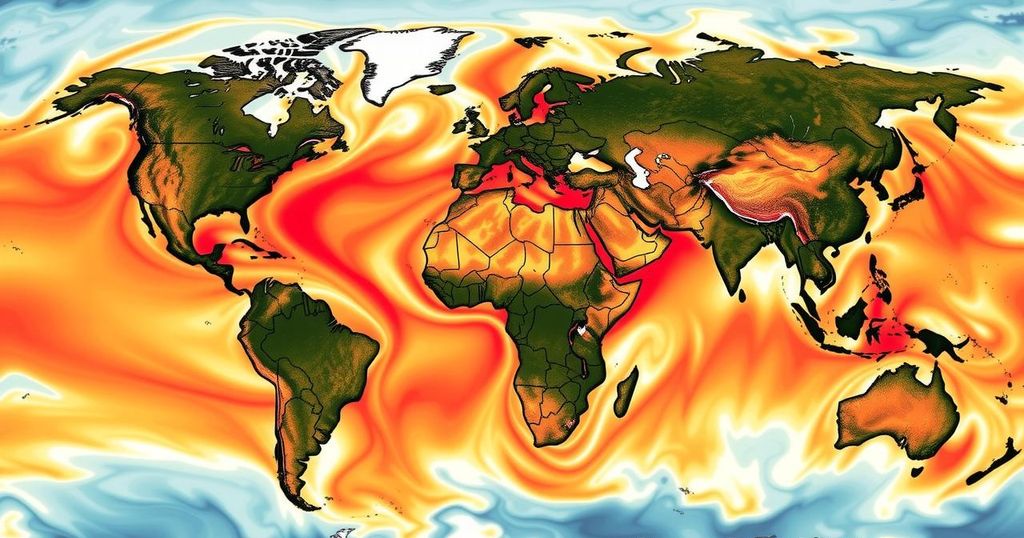2024 Marks Historic Temperature Milestone: Global Heating Surpasses 1.5°C

The year 2024 marked a record-breaking global average temperature of 1.6°C above preindustrial levels, surpassing the Paris Agreement’s 1.5°C target for the first time. Driven by fossil fuel emissions, this temperature increase has resulted in severe extreme weather events and widespread human suffering. Experts warn that without significant reductions in emissions, the probability of permanently overshooting climate targets increases substantially.
In 2024, the world experienced unprecedented heat, as the annual global temperature surged to 1.6°C above preindustrial levels, marking the first time the average temperature exceeded the internationally recognized threshold of 1.5°C. This increase, driven largely by the combustion of fossil fuels, has resulted in intensified extreme weather events, inflicting suffering upon countless populations. The EU’s Copernicus Climate Change Service (C3S) noted that record levels of heat stress affected 44% of the planet on July 10, 2024, and July 22 recorded the hottest day in history.
Experts maintain that while a single year above 1.5°C does not formally indicate a failure to meet the long-term targets set by the Paris Agreement, it does reflect a grim reality of the escalating climate emergency. Dr. Samantha Burgess, deputy director at C3S, emphasized the dangerous likelihood of surpassing the Paris threshold permanently if decisive action is not taken. The past decade has been marked by increasingly exceptional temperatures, with every year ranking among the ten hottest since 1850.
The ramifications are profound; climate change exacerbated disasters such as the floods in Valencia, hurricanes in the US, typhoons in the Philippines, and droughts in the Amazon. Dr. Friederike Otto from Imperial College London indicated that while immediate strategies are available to switch away from fossil fuels and bolster resilience, the global carbon emissions in 2024 are expected to reach all-time highs, indicating a concerning lack of actionable transition by nations.
Anticipation is building for the UN’s upcoming deadline in February, wherein countries must submit updated emissions reduction pledges. The expectation of a catastrophic 2.7°C of temperature increase by century’s end looms. The warming climate has been further fueled by the El Niño phenomenon and ongoing atmospheric changes leading to more extreme weather patterns, such as heavy rainfall and prolonged heatwaves.
The emerging consensus underscores a dire need for significant reductions in emissions, with targets suggesting a 45% decrease by 2030 if there is any hope of limiting temperature rises to 1.5°C. With the pace of severe weather events only intensifying, the health of ecosystems and the wellbeing of future generations hang in the balance, amplifying calls for immediate and ambitious action to mitigate climate change.
The article discusses the alarming trend of rising global temperatures, emphasized by the latest reports indicating that the year 2024 marked a critical milestone as the first time the world’s temperature exceeded the 1.5°C threshold set by the Paris Agreement. This uptick not only reflects growing climate crisis implications—such as extreme weather and its associated human suffering—but also sheds light on the urgent need for nations to transition away from fossil fuels and implement meaningful climate policies. Furthermore, it presents a foreboding outlook regarding the future climate trajectory if immediate action is not taken to curb emissions.
In conclusion, the surpassing of the 1.5°C threshold in 2024 signifies a critical juncture in the climate crisis, necessitating urgent and sustained global action to reduce emissions. As extreme weather events become more frequent and intense, the dire call for a shift away from fossil fuels has never been more pressing. The forthcoming submission of emissions-cutting pledges will be pivotal in determining if the world can stabilize rising temperatures and protect both human lives and ecosystems.
Original Source: www.theguardian.com





